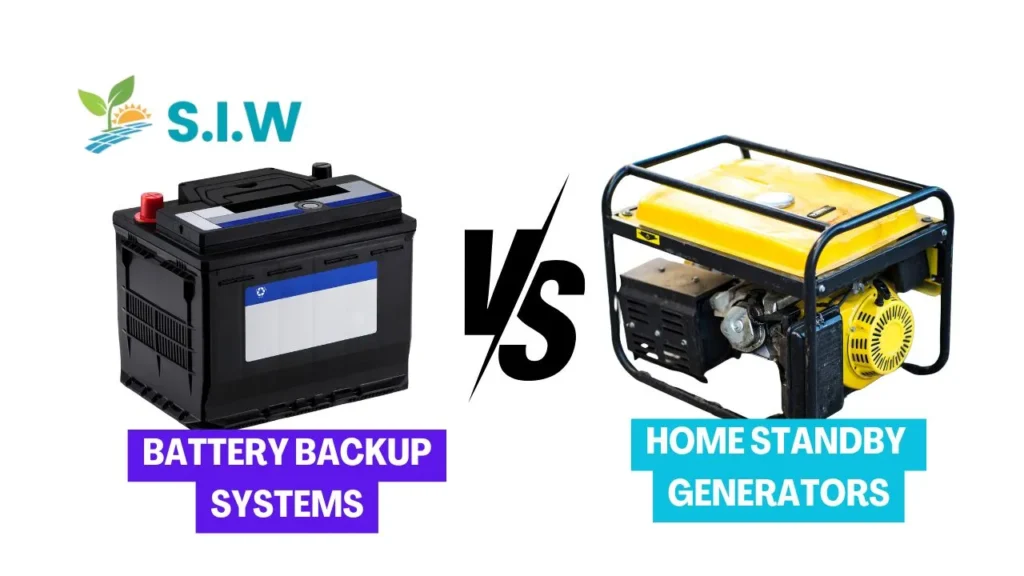In the quest for uninterrupted power during outages, homeowners often find themselves choosing between home standby generators and battery backup systems. Each offers distinct advantages and potential drawbacks, making it crucial to understand which solution best suits your needs. This comprehensive guide will compare home standby generators and battery backup systems, exploring their benefits, limitations, and overall effectiveness.
What Are Home Standby Generators?
Home standby generators are robust systems designed to provide a reliable power source during extended outages. They are typically fueled by natural gas or propane and are installed outside the home.
Advantages of Home Standby Generators
- Continuous Power Supply: Home standby generators automatically kick in when the power goes out, ensuring that your home remains powered without any manual intervention.
- High Capacity: These generators can handle the power needs of an entire house, including major appliances like HVAC systems, refrigerators, and lights.
- Long Runtime: Fueled by natural gas or propane, home standby generators can run for days or even weeks, depending on fuel supply.
- Automatic Operation: Standby generators start automatically during an outage and turn off once power is restored, providing convenience and peace of mind.
Disadvantages of Home Standby Generators
- High Initial Cost: The cost of purchasing and installing a home standby generator can be significant, including expenses for the generator itself, installation, and fuel.
- Maintenance Requirements: Regular maintenance is necessary to ensure reliable operation, including fuel checks, oil changes, and system tests.
- Noise Levels: Generators can be noisy, which might be a concern in residential areas.
What Are Battery Backup Systems?
Battery backup systems, often referred to as home battery storage systems, are designed to store energy from the grid or solar panels for use during power outages. They are typically installed indoors and can be integrated with home solar systems or used as standalone units.
Advantages of Battery Backup Systems
- Quiet Operation: Battery backup systems are silent, offering a more discreet solution compared to generators.
- Lower Maintenance: They require minimal maintenance, mainly involving periodic battery checks and software updates.
- Eco-Friendly: When paired with solar panels, battery backup systems can reduce reliance on fossil fuels and lower your carbon footprint.
- Energy Independence: Battery systems can store excess energy generated during the day for use at night or during outages.
Disadvantages of Battery Backup Systems
- Limited Capacity: Battery systems typically have a lower capacity compared to generators, making them suitable for essential loads but not for powering the entire house.
- High Upfront Cost: The initial investment can be substantial, especially for high-capacity systems or those integrated with solar panels.
- Shorter Runtime: Battery backup systems generally provide power for shorter durations compared to generators, typically from a few hours to a day depending on usage and battery capacity.
Comparing Performance: Home Standby Generators vs Battery Backup Systems
Power Output and Runtime
Home standby generators are unmatched in power output and runtime, making them ideal for long-term outages and high-demand situations. They can handle multiple appliances simultaneously and operate for extended periods, provided they have a sufficient fuel supply. In contrast, battery backup systems are more suitable for short-term outages and managing essential loads. Their runtime is limited by battery capacity and usage patterns.
Installation and Maintenance
Standby generators require professional installation and regular maintenance to ensure optimal performance. This includes checking fuel levels, performing system tests, and addressing any mechanical issues. Battery backup systems are easier to install and maintain, with fewer moving parts and less frequent service needs. However, the batteries themselves may need replacement every 5-10 years, depending on usage and battery type. For those considering a more sustainable option, our solar batteries installation service provides a reliable and eco-friendly alternative with streamlined installation and maintenance.
Cost Considerations
The initial cost of home standby generators is generally higher due to the purchase price and installation expenses. Additionally, ongoing costs include fuel and maintenance. Battery backup systems have a lower installation cost but can be expensive, particularly for high-capacity or integrated solar systems. Overall, the cost-effectiveness depends on individual power needs and preferences.
Environmental Impact
Battery backup systems are more environmentally friendly, especially when combined with solar energy. They reduce reliance on fossil fuels and lower greenhouse gas emissions. Home standby generators, while effective, rely on natural gas or propane, which contributes to carbon emissions.
Choosing the Right System for Your Home
Assess Your Power Needs
Determine your power requirements by evaluating the essential appliances and systems you need to keep running during an outage. If you require a comprehensive solution that can power your entire home, a standby generator might be more suitable. For basic needs or if you already have a solar system, a battery backup system could be a better fit.
Consider Installation and Maintenance
Factor in the ease of installation and ongoing maintenance requirements. If you prefer a low-maintenance solution, a battery backup system may be advantageous. However, if you are prepared to handle the maintenance and fuel management of a standby generator, it could offer more comprehensive coverage.
Evaluate Costs and Benefits
Compare the total costs of both systems, including installation, maintenance, and fuel or battery replacement. Consider the long-term benefits and how each system aligns with your energy needs and budget.
Environmental Impact
Consider your commitment to reducing your environmental footprint. Battery backup systems are generally more eco-friendly, particularly when paired with renewable energy sources like solar panels.
Conclusion
Both home standby generators and battery backup systems offer valuable solutions for maintaining power during outages, each with its strengths and limitations. Home standby generators excel in power capacity and runtime but come with higher costs and maintenance needs. Battery backup systems provide a quieter, lower-maintenance option with environmental benefits but have limited capacity and shorter runtimes. Assess your power needs, budget, and environmental priorities to choose the best solution for your home.








